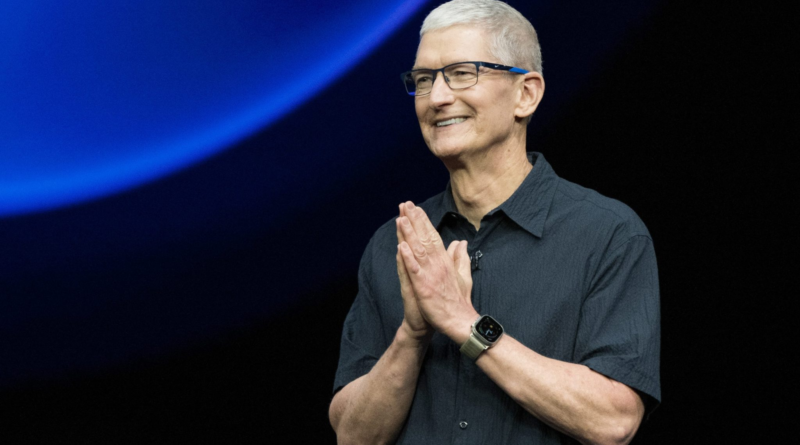Big Tech stocks lose some of their aura as earnings growth slows
Slowing profit growth is removing some of the invincibility surrounding the stock market’s technology giants as they prepare to report earnings this week. Whether they can reverse that trend will go a long way to determining if the rally in equities can keep going.
The five biggest companies in the S&P 500 Index by market capitalization — Apple Inc., Nvidia Corp., Microsoft Corp., Alphabet Inc. and Amazon.com Inc. — are projected to post average earnings growth of 19% in their third-quarter results, according to data compiled by Bloomberg Intelligence. While that would handily top the S&P 500’s projected 4.3% increase, it also would represent their slowest collective expansion in six quarters, BI data shows.
What’s more, the gap between Big Tech and the rest of the market is expected to continue to narrow into 2025, by which time last year’s roughly 35% quarterly earnings growth will be a distant memory. So the question for investors is what this means for these stocks, all of which have soared through the market’s latest rally, and whether they can continue leading indexes higher.
“Sentiment is a lot shakier than in past quarters, and the factors driving the market now feel more negative,” said Andrew Choi, portfolio manager at Parnassus Investments in San Francisco. “That doesn’t mean the rally is over, but there are opportunities elsewhere, especially as we have these debates about Big Tech valuations, slower earnings momentum, and every story now has some element of controversy or debate that’s weighing on sentiment.”
Market Rotates
For most of the past two years, the tech giants have led the S&P 500 higher, fueled by relentlessly expanding profits and investors willing to keep paying higher multiples for those earnings. That’s changed in recent months, however.
Since peaking on July 10 following a 22% rally to start the year, the Bloomberg Magnificent 7 Index, which is comprised of the five S&P behemoths as well as Meta Platforms Inc. and Tesla Inc., has fallen 2%. That lags every major sector in the S&P 500, with the utilities, real estate, financial and industrial groups jumping more than 10% and the broader index gaining 3.1% over the same span.
All of which has put Big Tech companies in a position they’re unaccustomed to: stock market underdogs. They’re facing greater scrutiny with valuations elevated and questions about when their heavy spending on artificial intelligence initiatives will pay off.
“Tech ceding its market leadership position could last through the end of the year, but that doesn’t scare us off from owning them long term,” said Ross Mayfield, investment strategist at Baird. “It’s obviously a risk that earnings growth is decelerating, and valuations may be a little stretched. But they still bring so much growth to the table And there’s still significant upside to earnings potential over the coming years.”
While Tesla has already posted better than expected third-quarter profits and an encouraging outlook, Big Tech earnings season really kicks off in earnest this week. Google-owner Alphabet reports on Tuesday, followed by Microsoft and Meta Platforms on Wednesday, and Apple and Amazon on Thursday. Nvidia isn’t expected to give results until late November.
An AI Future
All of this week’s reporters come with their own issues. Microsoft faces concerns about its prospects in AI. Apple has seen early signs of tepid demand for its newest iPhones, although long-term optimism helped send the stock to a record last week. Amazon investors are worried about heavy capital spending eating into profits. And Alphabet has regulatory uncertainty as the US Justice Department investigates it for monopoly practices.
AI will be a big focus for investors watching the earnings reports, particularly how much the companies are spending on expensive infrastructure. In the third quarter, Microsoft, Alphabet, Amazon and Meta Platforms are projected to have poured $56 billion into capital expenditures, up 52% from the same period a year ago.
Investors generally buy the premise that the companies’ AI investments represent the future of technology. But there’s also little evidence of an immediate burst of profitability for companies like Microsoft, which has integrated AI features into its software products. Disappointment over the disparity between AI spending and outcomes marred an otherwise strong second-quarter earnings season. Now, it’s raising concerns about future profit margins.
“Top-line gains are starting to get offset by surging AI-related capital spending,” Bloomberg Intelligence strategists Gina Martin Adams and Michael Casper wrote in a research note. “That implies peak margins are likely in the past, at least for the near term.”
Big Tech’s recent underperformance has coincided with souring sentiment from the so-called smart money on Wall Street. Hedge funds have been selling Magnificent Seven stocks over the past several months, and despite modest buying in October net long positions as a percentage of total US exposure are still around the lowest level since mid-2023, according to data from Goldman Sachs prime brokerage desk.
Valuation Conundrum
Despite the slump in megacap stock prices, many of these companies are carrying valuations that are higher than historical averages. Apple is trading at 32 times estimated profits over the next 12 months, compared with an average of 20 times over the past decade, according to data compiled by Bloomberg. Microsoft is priced at 33 times, compared with an average of 25.
“If you’re looking at tech, are earnings really going to grow enough to keep pace with these multiples, or does some of the recent strength reflect a fear of missing out?” said Clark Bellin, chief investment officer at Bellwether Wealth. “You can’t dismiss the impact of momentum, but at some point the music could stop, and people need to keep their expectations in check this earnings season.”
To be sure, Wall Street pros remain overwhelmingly bullish on Big Tech. Roughly 90% of the analysts covering Microsoft, Alphabet and Nvidia have buy ratings on the stocks, according to data compiled by Bloomberg. The figures are 83% for Alphabet and 65% for Apple, while the average S&P 500 company sits at about 53%.
The reason for the optimism is fairly simple. For all the concerns, they continue to offer above average profit growth, exposure to AI, strong capital returns and less risk than other stock market sectors, according to Parnassus’s Choi.
“It’s hard to find dominant businesses with this kind of earnings growth,” he said. “There’s still a lot to like.”




